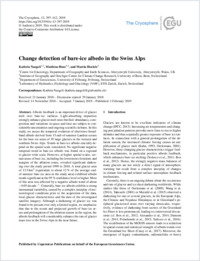Change detection of bare-ice albedo in the Swiss Alps
- Naegeli, Kathrin Centre for Glaciology, Department of Geography and Earth Sciences, Aberystwyth University, Aberystwyth, Wales, UK - Institute of Geography and Oeschger Centre for Climate Change Research, University of Bern, Switzerland
- Huss, Matthias Department of Geosciences, University of Fribourg, Switzerland - Laboratory of Hydraulics, Hydrology and Glaciology (VAW), ETH Zurich, Switzerland
- Hoelzle, Martin Department of Geosciences, University of Fribourg, Switzerland
-
01.02.2019
Published in:
- The Cryosphere. - 2019, vol. 13, no. 1, p. 397–412
English
Albedo feedback is an important driver of glacier melt over bare-ice surfaces. Light- absorbing impurities strongly enhance glacier melt rates but their abundance, composition and variations in space and time are subject to considerable uncertainties and ongoing scientific debates. In this study, we assess the temporal evolution of shortwave broadband albedo derived from 15 end-of-summer Landsat scenes for the bare-ice areas of 39 large glaciers in the western and southern Swiss Alps. Trends in bare-ice albedo crucially depend on the spatial scale considered. No significant negative temporal trend in bare-ice albedo was found on a regional to glacier-wide scale. However, at higher spatial scales, certain areas of bare ice, including the lowermost elevations and margins of the ablation zones, revealed significant darkening over the study period 1999 to 2016. A total glacier area of 13.5 km2 (equivalent to about 12 % of the average end-of-summer bare-ice area in the study area) exhibited albedo trends significant at the 95 % confidence level or higher. Most of this area was affected by a negative albedo trend of about −0.05 decade−1. Generally, bare-ice albedo exhibits a strong interannual variability, caused by a complex interplay of meteorological conditions prior to the acquisition of the data, local glacier characteristics and the date of the investigated satellite imagery. Although a darkening of glacier ice was found to be present over only a limited region, we emphasize that due to the recent and projected growth of bare-ice areas and prolongation of the ablation season in the region, the albedo feedback will considerably enhance the rate of glacier mass loss in the Swiss Alps in the near future.
- Faculty
- Faculté des sciences et de médecine
- Department
- Département de Géosciences
- Language
-
- English
- Classification
- Hydrology
- License
-
License undefined
- Identifiers
-
- RERO DOC 324341
- DOI 10.5194/tc-13-397-2019
- Persistent URL
- https://folia.unifr.ch/unifr/documents/307691
Statistics
Document views: 161
File downloads:
- pdf: 278
